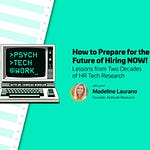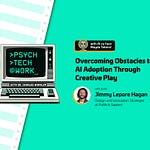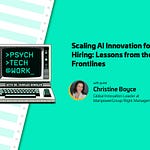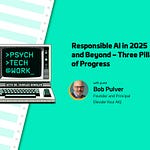“The future of assessments is about customization at scale. AI allows us to generate and adapt assessments in real-time, making them more relevant to specific job roles.”
–Ben Williams
Introduction:
In this episode of Psych Tech @ Work, I sit down with Ben Williams, Managing Director of Sten 10, to discuss how AI is reshaping the field of psychometric assessments and hiring processes. Our conversation dives into the evolving landscape of AI-driven assessments, the ethical considerations of using AI in hiring, and the challenges of maintaining transparency and fairness while incorporating new technologies. Ben shares insights into blending AI with traditional assessment tools and how this impacts the future of selection processes.
Key Topics Covered:
The role of AI in automating and customizing assessments
Emerging challenges in trust, fairness, and explainability in AI-powered hiring
The importance of designing job-specific psychometric tools that align with organizational needs
AI's potential in generating, scoring, and validating assessments
Future implications of AI on entry-level and senior hiring roles
Summary:
We explore AI’s role in streamlining psychometric assessments while addressing challenges in maintaining transparency and fairness. Ben describes how Sten 10 has integrated AI to make assessment processes faster and more personalized without losing the critical human oversight needed for ethical hiring practices.
We also discuss prompt engineering, AI literacy, and the limitations of AI-generated assessments. One significant takeaway is the growing importance of designing highly contextual and customized assessments using AI while ensuring they remain interpretable and meaningful.
We touch on real-world examples, including how AI can generate coaching tips and personality profiles, as well as potential concerns regarding the over-reliance on AI outputs. The conversation also highlights emerging roles related to AI governance and the need for regulatory oversight to ensure fair hiring practices.
Key Takeaways:
AI augments, but doesn’t replace human oversight: While AI is making assessments faster and more scalable, the need for human validation remains critical to ensuring fairness.
Custom psychometric assessments are the future: Moving beyond off-the-shelf tools, companies can develop highly specific and job-relevant assessments using AI.
Prompt engineering for assessments: Organizations can create better assessment tools by focusing on AI prompt development and optimization.
AI literacy is essential for hiring professionals: As AI becomes more embedded in hiring, HR professionals need to understand its benefits and limitations to apply it responsibly.
Trust and explainability are key: Companies must prioritize transparency to gain candidate trust and meet regulatory standards.
Conclusion:
AI’s role in hiring is evolving rapidly, and the opportunities for innovation are endless. However, as Ben notes, the path forward requires a careful balance between technological advances and maintaining human control. By designing psychometric tools with AI and human collaboration, organizations can achieve a fairer and more effective hiring process.
Take It or Leave It? Articles:
“Ineffective Human-AI Interactions and Solutions” — Oxford Review
Summary: This article delves into the factors influencing human-AI collaboration, including cognitive load and decision control. Ben highlights how integrating AI into familiar tools like Slack and Word can reduce friction and improve adoption.
“AI and Public Perception: What Americans Really Think” — Center for Data Innovation
Summary: A survey reveals mixed feelings about AI, with curiosity decreasing and negative emotions on the rise. Ben critiques the contradictions in public attitudes toward AI and how these perceptions could shape its future adoption in hiring.











